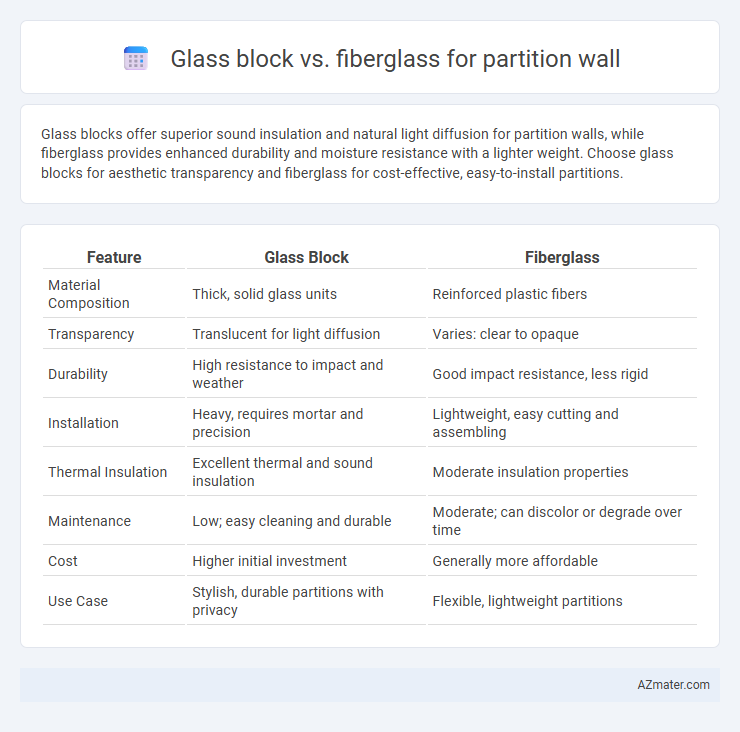Glass blocks offer superior sound insulation and natural light diffusion for partition walls, while fiberglass provides enhanced durability and moisture resistance with a lighter weight. Choose glass blocks for aesthetic transparency and fiberglass for cost-effective, easy-to-install partitions.
Table of Comparison
| Feature | Glass Block | Fiberglass |
|---|---|---|
| Material Composition | Thick, solid glass units | Reinforced plastic fibers |
| Transparency | Translucent for light diffusion | Varies: clear to opaque |
| Durability | High resistance to impact and weather | Good impact resistance, less rigid |
| Installation | Heavy, requires mortar and precision | Lightweight, easy cutting and assembling |
| Thermal Insulation | Excellent thermal and sound insulation | Moderate insulation properties |
| Maintenance | Low; easy cleaning and durable | Moderate; can discolor or degrade over time |
| Cost | Higher initial investment | Generally more affordable |
| Use Case | Stylish, durable partitions with privacy | Flexible, lightweight partitions |
Introduction to Partition Wall Materials
Glass blocks offer durability, sound insulation, and a distinctive aesthetic with translucent properties that allow natural light to pass through while maintaining privacy. Fiberglass panels provide lightweight, impact-resistant, and moisture-resistant solutions ideal for partition walls in commercial and residential spaces. Choosing between glass block and fiberglass depends on the desired combination of light diffusion, strength, and installation flexibility.
Overview of Glass Block Partitions
Glass block partitions provide a durable and visually appealing solution with excellent light transmission and sound insulation properties. These partitions consist of thick, translucent blocks that offer privacy while allowing natural light to permeate spaces, making them ideal for both residential and commercial applications. Their robust construction ensures long-lasting performance, low maintenance, and resistance to moisture, mold, and fire.
Overview of Fiberglass Partition Walls
Fiberglass partition walls offer lightweight durability and excellent moisture resistance, making them ideal for areas prone to humidity or wet conditions. These partitions provide sound insulation and thermal efficiency, enhancing privacy and energy savings in commercial and residential spaces. Compared to glass blocks, fiberglass panels are easier to install and maintain, with greater flexibility in design options.
Aesthetic Appeal: Glass Block vs Fiberglass
Glass blocks provide a distinctive, timeless look with a glossy, translucent surface that enhances natural light diffusion and adds architectural interest to partition walls. Fiberglass panels offer a smooth, matte finish that can be customized with various colors and textures, delivering a modern and versatile aesthetic suited to contemporary interiors. Both materials improve spatial brightness, but glass blocks create a more pronounced visual impact through light refraction and depth.
Light Transmission and Privacy Comparison
Glass blocks provide excellent light transmission, allowing natural daylight to penetrate while maintaining privacy due to their textured surface that obscures direct visibility. Fiberglass panels offer moderate light diffusion but typically allow less natural light compared to glass blocks, making them suitable for partitions where softer illumination and reduced transparency are desired. Privacy levels with fiberglass depend on opacity options, often providing more customizable privacy than glass blocks but with diminished light transmission efficiency.
Strength and Durability Factors
Glass blocks provide superior strength and durability due to their thick, solid construction and resistance to impacts, making them ideal for partition walls in high-traffic areas. Fiberglass partitions, while lightweight and flexible, generally lack the same level of impact resistance and can degrade faster under prolonged exposure to environmental stressors such as moisture and UV light. For long-term durability and structural integrity, glass block walls outperform fiberglass options by offering enhanced load-bearing capacity and minimal maintenance requirements.
Thermal and Acoustic Insulation Performance
Glass block offers superior thermal insulation due to its dense structure and air-trapping design, significantly reducing heat transfer compared to fiberglass panels. Fiberglass excels in acoustic insulation by absorbing sound waves effectively, making it preferable in environments where noise reduction is critical. Selecting between glass block and fiberglass for partition walls depends on prioritizing thermal efficiency or soundproofing requirements.
Installation Processes and Complexity
Glass block installation requires precise mortar application and careful alignment to ensure structural integrity and aesthetic appeal, often demanding skilled labor and longer curing times. Fiberglass partition walls offer a simpler, faster installation process with prefabricated panels that can be mounted directly onto metal or wooden frames, reducing labor complexity and time. The rigidity and weight of glass blocks increase installation challenges compared to the lightweight and flexible nature of fiberglass materials.
Maintenance and Longevity
Glass block partition walls offer exceptional durability and require minimal maintenance due to their resistance to moisture, stains, and scratches, ensuring a long-lasting aesthetic without frequent repairs. Fiberglass partitions, while lightweight and easy to install, may necessitate regular cleaning to prevent discoloration and can be more susceptible to damage over time, impacting longevity. For sustainable performance and minimal upkeep, glass blocks are preferred in high-traffic or moisture-prone environments.
Cost Analysis: Glass Block vs Fiberglass
Glass block partition walls typically cost between $40 and $70 per square foot, driven by material expense, installation complexity, and labor intensity. Fiberglass partitions are more budget-friendly, averaging $15 to $30 per square foot, due to easier installation and lower material costs. Choosing fiberglass reduces upfront expenses and installation time, while glass blocks offer durability and aesthetic appeal but at a premium price.

Infographic: Glass block vs Fiberglass for Partition wall
 azmater.com
azmater.com